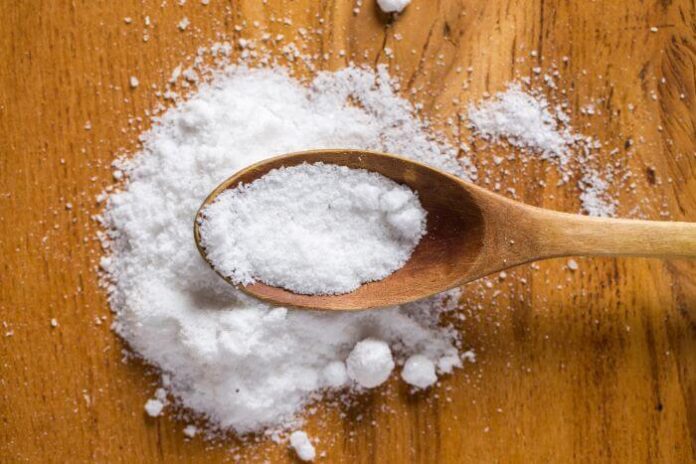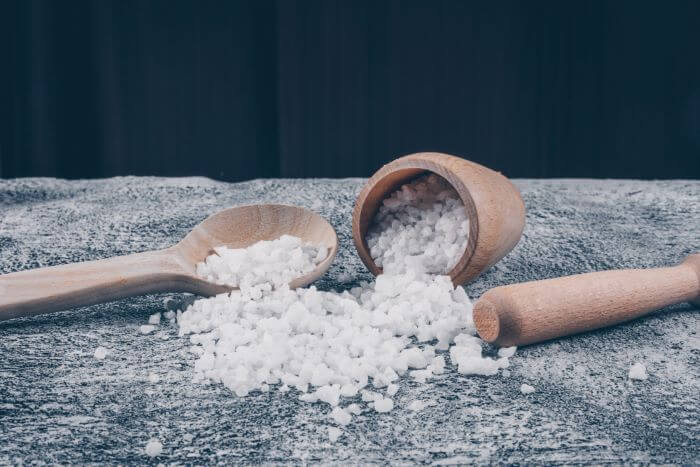Kosher salt has no doubt been a staple for decades for many in the cooking and seasoning world. But if you have noticed recently, the space of this favorite seasoning has been empty in many stores. Hence, people have been asking what could be the reason for this Kosher salt shortage.
Well, in this post, we will take a somewhat deep dive into this subject to help you see what’s really happening with kosher salt.
A Closer Look at Kosher Salt
Ever wondered why people are so concerned about the recent kosher salt shortage? Let’s take a quick look at this unique slat to help you understand.
Kosher salt, also known as flake salt, rock salt, Kashering salt, and Koshering salt, is more than just a cooking ingredient; it’s a culinary staple with a rich history. This edible salt, free from common additives like iodine, is a top choice for cooking, though not typically used as table salt.
Its history is intertwined with Jewish practices, where it was used for dry-bringing meat, a process known as Kashering. Initially, kosher salt was part of the Diamond Crystal brand. But recently, it became a product under Cargill, one of the world’s largest salt producers.
However, despite its rich history and popularity, we are now facing a kosher salt shortage – a shortage that has left many kitchens bereft of their beloved salt.
This shortage isn’t due to discontinuation but rather a hiccup in production. Now, let’s get a full picture of the whole thing.
What Happened to Kosher Salt – What’s Causing the Shortage?
Union Strikes at Windsor Salt
Many factors have been linked to the recent kosher salt shortage. Significant among them is the union strikes at Windsor Salt, one of Canada’s largest salt mines. These strikes have severely impacted the production of both Morton’s and Diamond Crystal kosher salts, leading to noticeable gaps on our grocery shelves.
Plant Issues
Another factor contributing to the shortage is an issue with one of the plants involved in Kosher Salt production. This issue, while not detailed, has caused significant supply problems, further compounding the shortage issue.
Rise of Cooking Blogs
Interestingly, the surge in popularity of cooking blogs and the increasing interest in home cooking has also played a part. As more people turn to creating culinary masterpieces at home, the demand for high-quality ingredients like kosher salt has skyrocketed.
What Are People Saying About the Recent Kosher Salt Shortage?
The shortage has certainly caused a stir among consumers. Many have taken to platforms like Reddit to express their concerns and share their experiences about the shortage.
From emails to manufacturers expressing dismay to observations about the absence of Kosher Salt on store shelves, the community is buzzing with conversations about the shortage.
Some are anxiously awaiting the restocking of shelves, while others have resorted to seeking alternatives. If you are also concerned about the increasing pang of the shortage, you may want to consider some kosher salt alternatives. We will talk about a few of them later in this post. So just keep reading!
Why is Kosher Salt Used in Cooking and Not as a Table Salt?
Kosher Salt’s culinary popularity stems from its unique properties. It lacks common metallic additives like iodine, making its taste purer. Its larger size also allows chefs to estimate the amount more accurately when seasoning by hand.
Plus, its lower density and lighter taste compared to table salt make it a preferred choice for enhancing flavors without overwhelming them. It’s particularly effective in cooking and juicing meats, and its large grains make it an excellent cleaner for kitchen utensils like cast iron skillets.
Is Kosher Salt Discontinued?
No, Kosher Salt has not been discontinued. The shortage is a temporary hiccup, and the manufacturers are working to resolve it. In the meantime, you can explore alternatives like Coarse Sea Salt or Himalayan Pink Salt in place of kosher salt.
How is Kosher Salt Made?
Kosher Salt production involves different methods. One popular method is solar evaporation of seawater, but most Kosher Salt comes from rock salt deposits in mines. The salt is then processed to achieve the desired grain size and texture.
For it to be certified kosher, it must adhere to specific Jewish dietary guidelines, which include no additives or chemical elements that go against kosher traditions.
What’s the Difference Between Kosher Salt and Sea Salt?
Kosher salt and sea salt differ in several ways:
- Source: Kosher salt is typically mined from land deposits, while sea salt comes from evaporated seawater.
- Texture: Kosher salt has larger, more uneven grains compared to the variable texture of sea salt.
- Processing: Sea salt is less processed than Kosher salt.
- Purity: Both are considered pure forms of salt, but kosher salt is often deemed purer due to the absence of sea pollutants.
- Color: Kosher salt is usually pure white, while sea salt varies in color.
- Price: Generally, Kosher salt is more affordable than sea salt.
Kosher Salt Shortage – Alternatives to Explore
#1: Coarse Sea Salt
The closest match to Kosher Salt in both taste and texture is Coarse Sea Salt. It has similar large, flaky grains and a flavor profile that mirrors Kosher Salt. You can use Coarse Sea Salt in a 1:1 ratio as a substitute in recipes.
However, remember that Coarse Sea Salt dissolves quicker than Kosher Salt, so you might want to add it a bit later in the cooking process.
#2: Fleur de Sel
Fleur de Sel is a premium alternative, known for its delicate, flaky texture and subtle briny flavor. It’s perfect for finishing dishes, from meats and soups to salads and even desserts. Since it’s less salty than Kosher Salt, you might need to use a bit more. Start with one teaspoon of Fleur de Sel for every 1 ¼ teaspoon of Kosher Salt and adjust to taste.
#3: Himalayan Pink Salt
A visually appealing and flavorful option, Himalayan Pink Salt, with its pink hue and mineral-rich profile, adds both color and a complex yet mild salty taste to dishes. Use it in a 1:1 ratio as a Kosher Salt substitute. Its coarse grains make it a versatile option for various culinary applications.
#4: Table Salt
Table Salt is a readily available substitute. It’s finer and denser than Kosher Salt and often iodized, giving it a slightly metallic aftertaste. When substituting, use about ¾ to ½ teaspoon of Table Salt for every teaspoon of Kosher Salt due to its saltier nature.
#5: Pickling Salt
Also known as canning salt, Pickling Salt is a great substitute if the texture of Kosher Salt is not crucial for your recipe. It’s similar in taste but lacks the flaky texture. Use about 1 ¼ to 1 ½ teaspoons of Pickling Salt for every teaspoon of Kosher Salt.
#6: Maldon Sea Salt
Maldon Sea Salt, known for its soft, flaky texture and slightly sweet flavor, is also a fine substitute for Kosher Salt. It has large pyramid-like crystals and is less salty. Begin with a 1:1 ratio and adjust as needed, keeping in mind its subtly sweet flavor.
#7: Hawaiian Red Salt
This is a striking choice with its red color from the iron oxide in Hawaiian volcanoes. Hawaiian red salt adds a unique earthy taste to dishes, making it a great option for curing meats or adding depth to dishes like poke bowls. Use it in a 1:1 ratio as a substitute for Kosher Salt.
Kosher Salt Shortage – Final Note
So, there you have it – a detailed look into the current Kosher Salt shortage. It’s a blend of production issues and increased demand.
While it may be a temporary setback for those who swear by this culinary favorite, it’s also an opportunity to explore alternatives and perhaps even discover new flavors.
If the current shortage is causing you concern and wondering whether kosher salt is discontinued, you don’t have to worry. It’s not the end of the road for kosher salt; the shortage is just an hiccup that will soon pass.
FAQs
Why does kosher salt taste so good?
Kosher Salt’s unique taste can be attributed to its purity and texture. Unlike other salts, it typically doesn’t contain additives like iodine or anti-caking agents, which means its saltiness is clean and unmarred by any metallic or chemical flavors.
Where does kosher salt come from in the world?
The salt is primarily sourced from rock salt deposits found in salt mines around the world. These deposits are remnants of ancient seas that have dried up over time. Kosher salt is mined, processed, and then packaged, maintaining its unique texture and purity. While it’s available globally, its production and popularity are particularly notable in North America.
What is the closest to kosher salt?
The closest substitute to Kosher Salt in terms of taste and texture is Coarse Sea Salt. It has similarly large and coarse grains, making it a great alternative for seasoning and marinating. Its texture and saltiness closely resemble Kosher Salt, making it a suitable substitute in most recipes.
Related Articles You Might Like:








